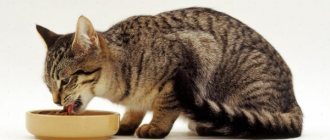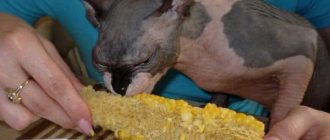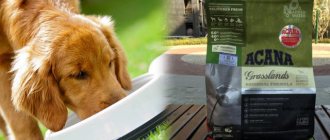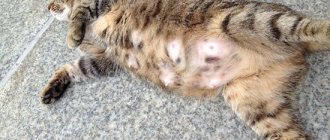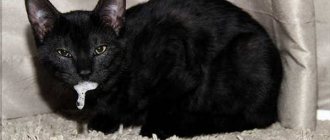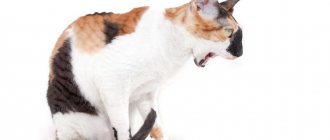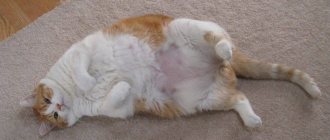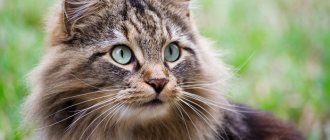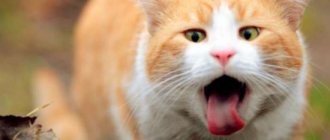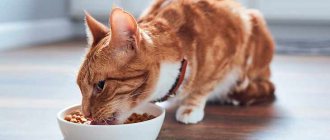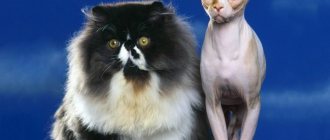What could be the causes of vomiting?
The following reasons are possible if a cat vomits undigested food.
Haste when eating
The cat vomits: vomiting, nausea, causes and treatment
Due to habit, cats may eat hastily but drink little. Lack of fluid in the body leads to vomiting. In this case, add a little water to the food. But you shouldn’t wait for the granules to swell, as the cat may not even like such a treat.
Note! Food diluted with water will swell greatly in the stomach. Therefore, standard portions need to be slightly reduced.
Binge eating
Can a cat vomit after eating dry food? Cats do not have a stopcock that will stop them when their stomach is full. They will eat as much as is in the bowl. When overeating, the pet’s stomach does not have time to stretch to accommodate the incoming volumes of food and gets rid of the excess in a simple way.
This phenomenon is especially often observed among owners of several pets, between whom there is a fight for food. Everyone tries to snatch a bigger piece for themselves and no longer cares about the amount of food.
Important! After vomiting, the cat may ask for food again. In this case, it is necessary to limit food intake. It is important that your pet chews the food and not swallows it.
Poor quality diet
If a cat is kept on economy class or cheap food, vomiting is a completely predictable phenomenon. To assimilate the food received, the animal’s body must have enough complete protein. If a cat vomits food, the reason may lie in the lack of this particular element. Cheap food contains very little meat; it is replaced with offal. Also, the preservatives and additives included in the food negatively affect the stomach, causing vomiting.
Important! You should not keep your pet on dry food all year round; it also needs natural food. Food waste from the table is not considered a natural product, since some of it can cause even greater harm to the pet.
Component intolerance
Why does a cat vomit after dry food? She may have allergies or intolerance to the components of the food, especially if it is cheap. Wheat or corn is added to many of these foods.
Vomiting can also be caused by a change in diet, so the body gets used to new foods.
What diets are considered unhealthy?
It is impossible to constantly feed the animal only dry food. Cat digestion also requires liquid and soft food. But we must not forget that a pet cannot eat everything that a person eats. For him, some foods from the human diet will be poisonous. Such products include tomatoes and eggplants, however, carrots should be present in the diet of your furry friend.
You should not feed your cat food that contains less than 25–30% meat. It is important that the food contains meat. Unscrupulous manufacturers often add by-products, eggs with shells, poultry bones and everything that is not usually eaten into food. Sometimes a food that is declared as a premium food contains all of the above. When choosing, you need to be very careful and careful. You should not immediately collect several packs of one type of food. If the food is sold by weight, it is better to take 100–200 grams, give it to the animal to try and monitor its reaction. The four-legged friend feels good, he does not vomit this food, which means it is suitable.
We recommend reading: Poultry Diseases Pictures of Kurbroilers
What symptoms require you to go to the clinic?
If the cat vomits food once, it is too early to panic. You should pay attention to the pet’s condition: whether its eyes are shiny, whether its nose is cold, what mood it is in - lethargic or active. Perhaps everything is fine with your health, but vomiting is caused by overeating.
A cat vomits fur every day: what to do?
If a cat vomits food regularly, it is accompanied by poor health and impurities of blood or bile in the rejected masses, the animal should be taken to a doctor for examination. Especially if the vomit is yellow or green.
If this cannot be done in the near future, you should provide first aid yourself. It consists of limited consumption of water and food: the latter is fed in small pieces every 2 hours. Only easily digestible foods are suitable: boiled chicken, cottage cheese or baby food.
Important! Don't put off going to the clinic. Regular vomiting can be a signal of dangerous diseases.
Urgent medical attention is required if:
- vomiting continues for more than a day;
- the pet refuses food and water;
- the rejected masses contain admixtures of mucus or blood;
- The cat’s well-being and mobility deteriorate.
Binge eating
When you need veterinary help
There is no need to worry if the cat vomits once and after a short period of time after eating, the animal remains active, mobile, and its nose is cold and wet.
Urgent veterinary intervention is required if:
- vomiting does not go away for more than a day;
- the animal began to refuse food and water;
- the cat vomits food mixed with blood, bile or mucus;
- The general condition has worsened, there is no mobility.
It is important to remember that if vomiting occurs several times a day and is accompanied by diarrhea, the likelihood of dehydration and death of the animal increases.
What to do if your cat vomits after eating undigested food
A cat vomits food once - this is an incident that is unlikely to pose a threat. Repeated situations require medical intervention.
Feed your cat more often, but with less food
The volume of a cat's stomach is small. Rather than overloading it with huge portions 1-2 times a day, it is better to feed it 4-5 times a day in small portions. This way the pet will be full and not overeat.
What to feed the cat in this case
What to feed a cat after vomiting? Switching to other dry foods will not always bring results, and may even worsen them. A sick pet is gradually fed with natural products: boiled chicken, cottage cheese, baby food.
But you should not immediately switch the animal to natural products after low-quality semi-finished products, since a sudden change in diet will negatively affect the pet’s already poor health.
Doctor
Treatment for overeating
“Treatment” is perhaps too strong a word, because overeating is not a disease as such, but a behavioral syndrome that certainly requires correction. The following methods will help you fight cat overeating.
Weight control food
Foods for overweight cats are produced by many brands, the main thing is that they contain high-quality sources of animal rather than plant protein. You should also pay attention to the amount of carbohydrate ingredients (grain and its derivatives, starchy vegetables, etc.) - there should be as little of them in the food as possible.
Strict feeding and dosing regimen
If the brand of food allows it, calculate the amount of food according to the table “for cats with low activity levels” or “for overweight cats”. If you do not have the opportunity to feed your cat during the day, purchase an automatic feeder - there are devices designed for several feedings, and are also suitable for wet food.
Interactive feeders
Otherwise known as “food puzzles,” these are special puzzle feeders that significantly complicate and slow down food intake, turning it into an exciting hunting game. Many feeders are suitable for both dry and wet food.
Preventive measures
Compliance with preventive measures will avoid the problem of indigestion of food. What to do?
- The pet should always have access to clean water, especially if the diet is dry;
- You shouldn’t skimp on your pet’s health; its stomach needs high-quality nutrition. It is better to give him premium food;
- It is better to divide feeding into 4-5 times in small portions, so the cat will not overeat;
- worm your pet regularly, as worms and parasites also interfere with digestion;
- it is also necessary to choose the right food in accordance with the breed, age and condition of the pet;
- Be sure to regularly visit the veterinarian and carry out preventive vaccinations.
Important! You cannot give your pet medications or treatment on your own without a doctor’s recommendation. The owner may incorrectly determine the diagnosis, and attempts to save the pet will only hasten its death.
Natural product
If your cat vomits from food, you should get treatment as soon as possible. Rather than putting off going to the doctor or hoping that it “will go away on its own,” it is better to take measures as soon as possible so that the pet will delight its owner with its love and health for a long time.
If a cat vomits undigested food, what should I feed it?
Trying to switch a cat that has vomited food to natural food or canned food may not work or even make the situation worse. A sudden change in the type of diet received often provokes intestinal upset and, accordingly, has a negative impact on an already unwell animal.
We recommend reading: Causes of Dandruff in Animals
We recommend monitoring how much your cat drinks and feeding it super premium dry food. Moreover, this food must be selected in original packaging; this is the only way you can guarantee that it was stored in proper conditions.
Sanabelle food from Bosch is one of the best options available on the market today. Our food contains substances necessary to maintain the health of your pet, helps prevent urolithiasis and facilitates the removal of hairballs naturally.
Trying to switch a cat that has vomited food to natural food or canned food may not work or even make the situation worse. A sudden change in the type of diet received often provokes intestinal upset and, accordingly, has a negative impact on an already unwell animal.
Overeating and rapid absorption of food
Quite often, a cat may vomit after eating due to overeating or eating food too quickly. In a kitten, the esophagus is horizontal, and when large portions are ingested, the body can close the sphincter located in the lower esophagus and cause regurgitation of undigested food. This vomiting occurs a few minutes after the pet has eaten.
We recommend reading: Dog Poisoned From Rotten Meat
This behavior is often observed in cats living in the same territory with other animals. The pet is trying to survive the competition and because of this, it tries to eat as much food as possible at one time. If a cat owner is faced with such a situation, then he should change the feeding rules.
It is recommended to give the cat a standardized portion at a time, in which the components are not cut very finely, but not very coarsely. If several cats live in the same house, they should be fed in separate rooms so as not to provoke competition between pets. If your cat feels safe while eating and does not feel threatened by other pets, she will be able to eat slowly and naturally, rather than greedily gulping down the entire portion in a few minutes.
